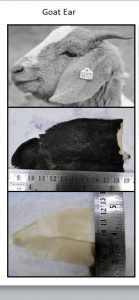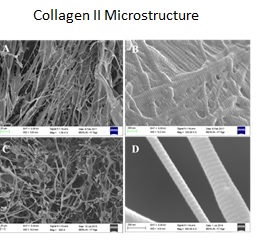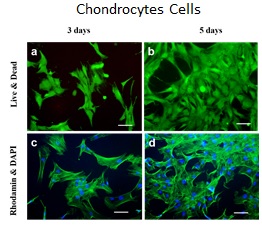
A joint research team, including a multidisciplinary team of researchers from IIT Kharagpur, use goat ear [bio-waste] to produce Collagen for cartilage regeneration therapy
Covid-19 is the latest health threat for the aged. Arthritis has been their bane for a long time, affecting the elderly mostly due to inflammation, or wear and tear of their bodies. Even for the younger generation, trauma, degenerative joint diseases, obesity or joint instability could be ample reasons for an unforgiving joint ache or debility. But technological innovations are making it possible to look at early detection of cartilage degeneration and, therefore, regeneration therapy as a long-term solution to these conditions.
 The therapy requires the use of Collagen, the protein that helps maintain the structure and functionality of the cartilage. Once Collagen becomes available as oral nutrient supplements or injectable gel, the therapy will receive a big boost. However, isolating the protein in large amounts is a problem and researchers the world over are looking for ways to do that from various sources.
The therapy requires the use of Collagen, the protein that helps maintain the structure and functionality of the cartilage. Once Collagen becomes available as oral nutrient supplements or injectable gel, the therapy will receive a big boost. However, isolating the protein in large amounts is a problem and researchers the world over are looking for ways to do that from various sources.
Researchers at IIT Kharagpur have a solution. They have found that copious amounts of Collagen can be isolated and purified in a cost-effective way from the cartilage of disposed goat ears, which is a commonly available bio-waste product. Not only that, they have also prepared a Collagen infused injectable hydrogel that could be used in cartilage regeneration therapy. (Read the research paper here – https://www.nature.com/articles/s42003-019-0394-6)
 The isolated Collagen was incorporated in a highly stable Pluronic F127 gel base. The CP (Collagen-Pluronic) hydrogel could be used for cartilage regeneration therapy. In addition, when combined with stem cells derived from the goat ear adipose tissue, this injectable hydrogel was found in laboratory conditions to highly facilitate cartilage formation. It could thus speed up the healing of cartilage injury.
The isolated Collagen was incorporated in a highly stable Pluronic F127 gel base. The CP (Collagen-Pluronic) hydrogel could be used for cartilage regeneration therapy. In addition, when combined with stem cells derived from the goat ear adipose tissue, this injectable hydrogel was found in laboratory conditions to highly facilitate cartilage formation. It could thus speed up the healing of cartilage injury.
Using a novel addition to the existing process, the researchers, led by Prof. Santanu Dhara of the School of Medical Science and Technology of IIT Kharagpur, have shown that the isolation process could be simple, cost-effective and fast. Whereas the maximum yield from existing process for isolating Collagen from other sources is below 55 per cent, the process used by the research team that included precipitation with a sodium chloride solution for 48 hours, reported more than 55 per cent yield.
 Prof. Dhara said, “The blended CP hydrogel has an encouraging result to be used as injectable hydrogel for cartilage regeneration and also to perform as a stem cell delivery vehicle by minimal invasion.” The multi-institutional and multidisciplinary team included researchers from the School of Medical Science and Technology, Department of Biotechnology and Rubber Technology Centre of IIT Kharagpur and from the Centre for Healthcare Science and Technology, IIEST, Shibpur.
Prof. Dhara said, “The blended CP hydrogel has an encouraging result to be used as injectable hydrogel for cartilage regeneration and also to perform as a stem cell delivery vehicle by minimal invasion.” The multi-institutional and multidisciplinary team included researchers from the School of Medical Science and Technology, Department of Biotechnology and Rubber Technology Centre of IIT Kharagpur and from the Centre for Healthcare Science and Technology, IIEST, Shibpur.
The team additionally used a newly developed mass spectrometric analytic method to study the structure of the isolated Collagen. The findings from the MALDI-MS/MS analysis, which showed post-translational modifications in the position and expression of hydroxyproline (Hyp), a crucial part of the triple helix structure of Collagen, will help in the early detection of cartilage disorders, including of arthritis.
 The identification and mapping of Hyp position in signature motif plays an important role to correlate molecular alteration of the component chains of cartilage with the progression of arthritis. Prof. Dhara said, “This identification may contribute to early prediction of dysfunctional collagen leading to rheumatoid arthritis as well as molecular identification of Collagen from other sources.”
The identification and mapping of Hyp position in signature motif plays an important role to correlate molecular alteration of the component chains of cartilage with the progression of arthritis. Prof. Dhara said, “This identification may contribute to early prediction of dysfunctional collagen leading to rheumatoid arthritis as well as molecular identification of Collagen from other sources.”
The team included Priti Prasanna Maity, Debabrata Dutta, Sayan Ganguly, Kausik Kapat, Krishna Dixit, Ramapati Samanti, Prof. Narayan Chandra Das, Prof. Amit Kumar Das and Prof. Dhara from IIT Kharagpur, Prof. Amit Roy Chowdhury and Dr. Pallab Datta from IIEST.



